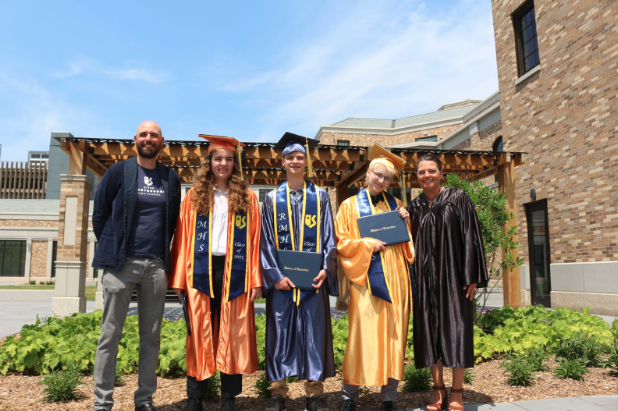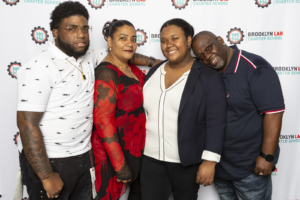Talk About It: Why Asking Questions and Sharing Ideas is a Core Part of Starting a School
Key Points
-
The sooner you get your idea out of your head, build your launch team, and create awareness in your community, the more likely you are to be successful.
-
When founding a school you need to constantly be asking – and seeking answers to – questions.

By: Dr. Eric Oglesbee
I never intended to start a high school.
It was in the Spring of 2015 while walking with a junior high teacher from the private Montessori school my children attended that I asked a simple question whose answer would fundamentally alter the trajectory of my professional and personal life.
“Has anyone thought about adding a high school to our school?” I asked as we walked together up a path at a local educational farm, kicking muck off our boots as we went. Behind us followed a train of junior high (grade 7-8) Montessori students who had just finished helping a group of Primary (age 3-5) students do an exploratory “swamp walk” through the farm’s marsh to experience first-hand the features of this vital ecosystem. I had joined them as a parent volunteer for the day. The teacher shrugged and said, “It’s been talked about, but it hasn’t really gone anywhere.”
“Huh,” I replied. “Well, if you want to start one, I think I’d be interested in teaching in it.”
Just a few short months later being “interested in teaching” at a Montessori high school morphed into resigning my tenured faculty position at a local university and radically altering my career path to design and launch an urban, community-centered Montessori high school.
Fast forward 5 years to August 13, 2020. On that hot August morning, I found myself standing in a parking lot outside the education wing of a church in downtown South Bend along with my co-founder, Eileen Mariani, taking the temperature of – and handing masks to – the first students to walk through the doors of River Montessori High School (RMHS). In between a couple of arrivals, I looked at her, pulled down my mask, and quietly mouthed the words, “we did it.”
But how? RMHS is an improbable aberration, right? I mean, how did a former professor and elementary teacher go from the notion of starting a school in 2015 to actually opening one in 2020 and standing next to its first graduates in 2023? It’s a question I reflect on quite a bit as I guide others through the process of launching new private schools in my current role as the Director of the Founders Program at the Drexel Fund. Every startup journey is unique, but I’ve noticed three interconnected themes that are a part of each success story.
You ask questions. Lots of them.
Asking questions – and not being afraid of where the answers lead you – is a key part of walking the road to designing and opening a new school. When we see something “not right” in the educational environments around us we can intuitively feel that things need to be different, but we have to interrogate those feelings to get at the core reality that needs to be changed.
Why are students dropping out? What is it about their current environment that seems to be holding them back? What should a graduate be able to do? Who needs this school (i.e., what does my proposed school offer that no one else is doing or not doing well?)
These are important academic model and market demand questions, but there are also a number of vital, non-academic questions to ask, especially if your motivation is to start a school to meet your own child’s needs.
What if the school I start ends up not working for my child? Am I committed to doing this even if things don’t work out for my own family? What if the school’s needs run counter to what my child needs? Am I willing to fail?
While building a school to serve one’s own child is a powerful motivation that can sustain a person through the inevitable challenges of founding a school, it is also a dangerous one. The important takeaway is that when founding a school you need to constantly be asking – and seeking answers to – questions, and not just ones about the academic model. But where do you get your answers or even figure out the questions you need to be asking?
You build a community of supporters…and skeptics.
At a very early stage we invited supporters and skeptics into our visioning and planning process. Hearing answers to our questions from just our “cheerleaders” or our own brains wasn’t enough. We needed to know the questions and concerns of others because honestly, we didn’t know what we didn’t know.
In our case, this first took the form of spending 5 months in early 2016 meeting regularly with a group of individuals who were lovingly skeptical of what was being proposed. That gave us a chance to try out different responses and explore novel ideas. It also forced us to repeatedly narrow our focus and hone in on the core identity of our school. This moved us from general notions of what we wanted the school to look like to very specific principles for how we were going to educate students. It also created a critical mass of individuals who years later would become some of the first board members and parents.
I won’t sugarcoat it though. Hearing people push back against our ideas for innovation was hard, as was making peace with the fact that there would always be people who weren’t going to see the merit in what we were doing. But I’m glad we had so many voices – both supportive and critical – as together they kept us moving forward.
But how does a launch team move from questioning and planning to actually being able to set an opening date and recruit families?
You get your big break(s).
What do I mean by a “big break?” Well, it looks different for every startup journey. It might take the form of someone overhearing you talk about your proposed school and later coming up to you saying, “Hey, I heard you are looking for a school location. I have a place you should look at which has been vacant for the last four years.” Or, maybe a friend of yours is talking with another friend about your school idea at a wedding and as a result of that conversation this “friend of a friend” ends up becoming your school’s first major donor and board president. It could even look like getting an email out of the blue from someone you haven’t talked to in more than a year saying, “Have you heard of the Drexel Fund?”
Turns out, none of the above are hypotheticals: each was one of our “big breaks” (yes, plural). None of these are things we could have scripted or planned, and one might say we were “lucky.” But to quote Seneca, “Luck is what happens when preparation meets opportunity.” By relentlessly asking and answering questions and continually building a community of supporters and skeptics, we positioned ourselves for these moments of opportunity. If you talk to anyone who has successfully launched a school, I’m sure they would tell you similar stories.
So…what now?
If you have a passion for bringing a new private school to your community you might be wondering what some concrete next steps might be.
One option is to attend one of the Drexel Fund’s upcoming information sessions for private school entrepreneurs. At these sessions, you will learn about the pillars of school startup and hear about how The Drexel Fund supports the launch of new private schools. You could also apply for the 2024-25 Drexel Fund Founders Program. Even just completing the application will help you clarify your proposed school model and identify what questions you need to ask during your startup process.
Whether or not you take any of the above next steps, there is one thing I encourage everyone to do who is considering launching a school: talk about it. All the time. Let people know what you are thinking. No one does this alone, and the sooner you get your idea out of your head, build your launch team, and create awareness in your community, the more likely you are to be successful.
Dr. Eric Oglesbee is the director of the Founders Program at the Drexel Fund, a venture philanthropy organization dedicated to increasing access to high-quality private education for low-income families. He is also the co-founder and board president of River Montessori High School (RMHS) in South Bend, Indiana.






0 Comments
Leave a Comment
Your email address will not be published. All fields are required.